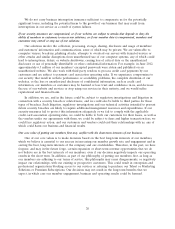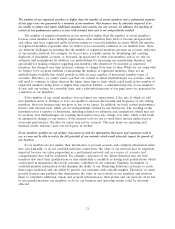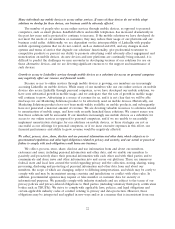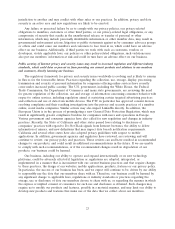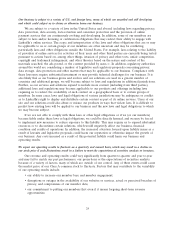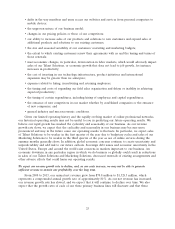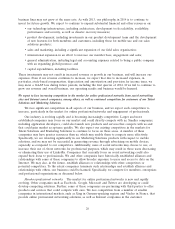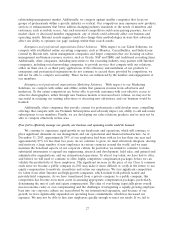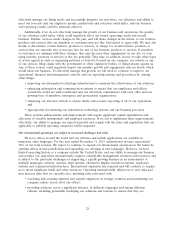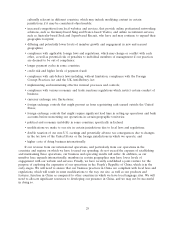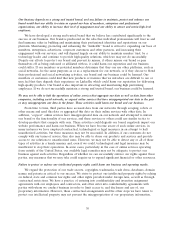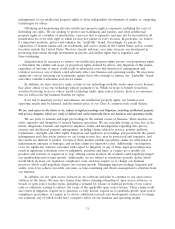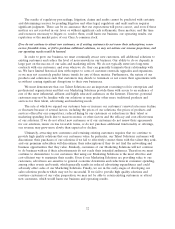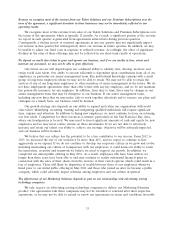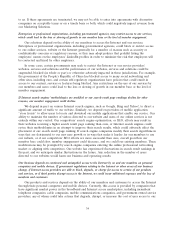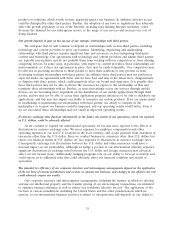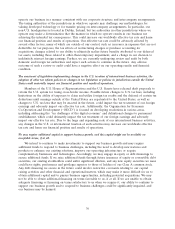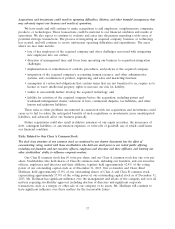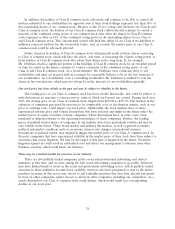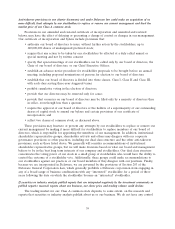LinkedIn 2013 Annual Report Download - page 32
Download and view the complete annual report
Please find page 32 of the 2013 LinkedIn annual report below. You can navigate through the pages in the report by either clicking on the pages listed below, or by using the keyword search tool below to find specific information within the annual report.Our business depends on a strong and trusted brand, and any failure to maintain, protect and enhance our
brand would hurt our ability to retain or expand our base of members, enterprises and professional
organizations, our ability to increase their level of engagement and our ability to attract and retain high level
employees.
We have developed a strong and trusted brand that we believe has contributed significantly to the
success of our business. Our brand is predicated on the idea that individual professionals will trust us and
find immense value in building and maintaining their professional identities and reputations on our
platform. Maintaining, protecting and enhancing the ‘‘LinkedIn’’ brand is critical to expanding our base of
members, enterprises, advertisers, corporate customers and other partners, and increasing their
engagement with our services, and will depend largely on our ability to maintain member trust, be a
technology leader and continue to provide high-quality solutions, which we may not do successfully.
Despite our efforts to protect our brand and prevent its misuse, if others misuse our brand or pass
themselves off as being endorsed or affiliated with us, it could harm our reputation and our business
could suffer. If our members or potential members determine that they can use other platforms, such as
social networks, for the same purposes as or as a replacement for our network, or if they choose to blend
their professional and social networking activities, our brand and our business could be harmed. Our
members or customers could find that new products or features that we introduce are difficult to use or
may feel that they degrade their experience on LinkedIn, which could harm our reputation for delivering
high-quality products. Our brand is also important in attracting and maintaining high performing
employees. If we do not successfully maintain a strong and trusted brand, our business could be harmed.
We may not be able to halt the operations of online services that aggregate our data as well as data from other
companies, including social networks, or copycat online services that have misappropriated our data in the past
or may misappropriate our data in the future. These activities could harm our brand and our business.
From time to time, third parties have accessed data from our networks through scraping, robots or
other means and used this data or aggregated this data on their online services with other data. In
addition, ‘‘copycat’’ online services have misappropriated data on our network and attempted to imitate
our brand or the functionality of our services, and these services or others could use similar tactics to
develop products that compete with ours. These activities could degrade our brand, negatively impact our
website performance and harm our business. When we have become aware of such online services, in
many instances we have employed contractual, technological or legal measures in an attempt to halt
unauthorized activities, but these measures may not be successful. In addition, if our customers do not
comply with our terms of service, they also may be able to abuse our products and services and provide
access to our solutions to unauthorized users. However, we may not be able to detect any or all of these
types of activities in a timely manner and, even if we could, technological and legal measures may be
insufficient to stop their operations. In some cases, particularly in the case of online services operating
from outside of the United States, our available legal remedies may not be adequate to protect our
business against such activities. Regardless of whether we can successfully enforce our rights against these
parties, any measures that we may take could require us to expend significant financial or other resources.
Failure to protect or enforce our intellectual property rights could harm our business and operating results.
We regard the protection of our trade secrets, copyrights, trademarks, trade dress, databases, domain
names and patents as critical to our success. We strive to protect our intellectual property rights by relying
on federal, state and common law rights and other rights provided under foreign laws, as well as through
contractual restrictions. We have a practice of entering into confidentiality and invention assignment
agreements with our employees and contractors, and often enter into confidentiality agreements with
parties with whom we conduct business in order to limit access to, and disclosure and use of, our
proprietary information. However, these contractual arrangements and the other steps we have taken to
protect our intellectual property may not prevent the misappropriation of our proprietary information,
30


